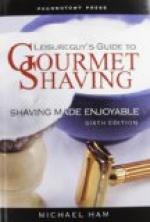“But that don’t answer my riddle,” he added, impatiently. “What made Jed act the way he did? Got the answer, Charlie?”
The young man shook his head. “No, by George, I haven’t!” he replied.
“How about you, Mrs. Armstrong? Can you help us out?”
Ruth’s answer was brief. “No, I’m afraid not,” she said. There was a queer note in her voice which caused her brother to glance at her, but Captain Hunniwell did not notice. He turned to go.
“Well,” he said, “I wish you’d think it over and see if you can spy land anywheres ahead. I need a pilot. This course is too crooked for me. I’m goin’ home to ask Maud; maybe she can see a light. So long.”
He went out. When Charles returned, having accompanied his employer as far as the door, he found Ruth standing by her chair and looking at him. A glance at her face caused him to stop short and look at her.
“Why, Ruth,” he asked, “what is it?”
She was pale and trembling. There were tears in her eyes.
“Oh, Charlie,” she cried, “can’t you see? He—he did it for you.”
“Did it for me? Did what? Who? What are you talking about, Sis?”
“Jed. Jed Winslow. Don’t you see, Charlie? He pretended to have found the money and to have stolen it just to save you. He thought you—he thought you had taken it.”
“What? Thought I had taken it? I had? Why in the devil should he think—”
He stopped. When he next spoke it was in a different tone.
“Sis,” he asked, slowly, “do you mean that he thought I took this money because he knew I had—had done that thing at Middleford? Does he know—about that?”
The tears were streaming down her cheeks. “Yes, Charlie,” she said, “he knows. He found it out, partly by accident, before you came here. And—and think how loyal, how wonderful he has been! It was through him that you got your opportunity there at the bank. And now—now he has done this to save you. Oh, Charlie!”
CHAPTER XIX
The clock in the steeple of the Methodist church boomed eleven times and still the lights shone from the sitting-room windows of the little Winslow house and from those of Jed’s living quarters behind his windmill shop. At that time of year and at that time of night there were few windows alight in Orham, and Mr. Gabe Bearse, had he been astir at such an hour, might have wondered why the Armstrongs and “Shavings” were “settin’ up.” Fortunately for every one except him, Gabe was in bed and asleep, otherwise he might have peeped under Jed’s kitchen window shade—he had been accused of doing such things—and had he done so he would have seen Jed and Charlie Phillips in deep and earnest conversation. Neither would have wished to be seen just then; their interview was far too intimate and serious for that.




